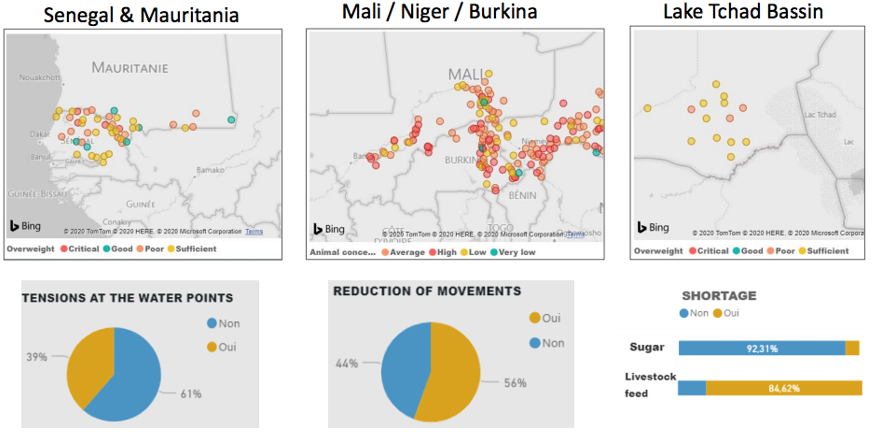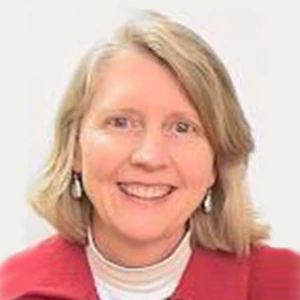Currently, the focus of our entire world is on COVID-19, flattening the curve and trying to find a vaccine for this global pandemic. Under these circumstances, it is critical to continue to continue to shed a light on the reality of vulnerable pastoral communities in the Sahel.[1]
Around 50 million people depend on pastoralism for their livelihood in the Sahel and Saharan fringes.[2] Pastoralism plays an important role in current food and nutrition security in the Sahel and in the maintenance of the agro-ecosystems and employment. In 2018-2019, the Data Innovation Fund (DIF), funded by the Trust Fund for Statistical Capacity Building (TFSCB), supported the scale-up of a Pastoral Early Warning System (PEWS), developed by Action contre la Faim (ACF) (Action Against Hunger),[3] which began in 2010 to regularly track drought’s impacts in the Sahel using satellite images and geospatial technologies and later added data collected from sentinel sites on the ground. The goal of the system (refer to image below) was to improve the response capacity to the food and nutrition crisis in pastoral and agro-pastoral livelihood regions.
The DIF funding helped improve the PEWS to incorporate two sets of data that are complementary. The first is near-real-time data collected from the field as SMS/Phone surveys about livestock conditions on 122 “sentinel sites” in Burkina Faso, Mali, Niger, Mauritania and Senegal. The second is satellite images used to generate biomass and surface water productions and accessibility. The outputs of this pastoral resources and risks monitoring system are interactive maps, graphs and time series that are available on the GeoSahel website designed for data visualization and queries. In addition, bi-monthly reports and alerts are published on the SigSahel website. These bulletins or reports are also distributed through a mailing list to key stakeholders in these countries, as well as to regional and international humanitarian organizations.
Before the onset of COVID-19 in March 2020, some of the key findings were (i) Lack of pasture all over the region, (ii) Drying up of most surface water bodies, (iii) Early movements of herders in Mauritania and Senegal due to huge biomass deficits, and (iv) Restricted movements in Mali, Niger and Burkina Faso due to insecurity.
The PEWS was modified in May 2020 to incorporate COVID-19 specific monitoring, and weekly data are being collected in over nine countries using more than 330 relays. This system provides weekly information on the situation of pastoral households, through a public analysis platform (refer to image below). This increase in surveillance, both in geographical coverage and metrics collected, has been possible through the consolidation of a strategic partnership between Action contre la Faim with Réseau Billital Maroobé (RBM) (pastoral association network). New elements such as the markets situation, economic activity disruption, or prices and shortage of livestock feed and basic necessities are being monitored on a weekly basis.
Initial findings indicated a strong impact on herders. The impacts as of June 25, 2020 included 54% restriction on movement; 65% increase in animal sales; 17% closure of major rural markets; and low support to the pastoral sector. Three hotspots of food insecurity concerns have been identified as:
- Senegal and Mauritania: Lack of pasture and water, animal concentration in abnormal regions.
- Mali, Niger and Burkina Faso: Difficulty to access water, pasture, feeds and tensions close to water points in Burkina Faso.
- Lake Tchad Basin: Insecurity issues and lack of livestock feeds.
Using this system, the risks identified for the pastoral communities in West and Central Sahel are (i) Food insecurity, (ii) Risks of conflicts between farmers/herders and herders, and (iii) Sanitarian risks due to important animal & human concentration around water points. Based on these findings, mitigation measures identified to counter the negative impact on herders include:
Mitigate impacts on herders’ livelihoods
- Livestock feed distribution, vaccination, guarantee water access
- Support animal prices
- Support access to cash and food at reasonable prices
- Increase coverage of Social Safety nets
Mitigate conflicts
- Advocacy to remove movements restrictions for herders
- Focus groups with communities to discuss problems related to the livestock’s pressure on local resources and find solutions
- Radio broadcasts to inform and establish channels of communication between communities.
Mitigate sanitarian risks
- Advocacy to remove movements restrictions for herders
- COVID-19 Awareness campaigns
We hope the early identification of the impact of COVID will help policy makers make informed decisions to lower the impact of the pandemic and help the pastoral community in the Sahel recover faster.
The Trust Fund for Statistical Capacity Building (TFSCB) is supported by the United Kingdom’s Department for International Development, the Government of Korea, and the Department of Foreign Affairs and Trade of Ireland.







Join the Conversation